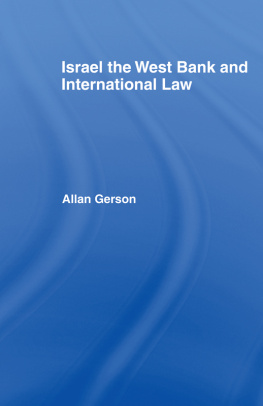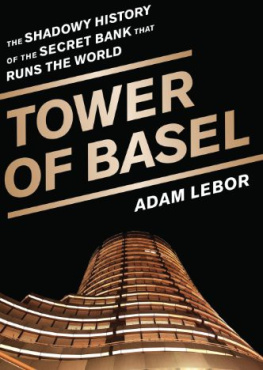TOWER OF BASEL


Copyright 2013 by Adam LeBor
Published in the United States by PUBLICAFFAIRS, a Member of the Perseus Books Group
All rights reserved.
No part of this book may be reproduced in any manner whatsoever without written permission except in the case of brief quotations embodied in critical articles and reviews. For information, address PUBLICAFFAIRS, 250 West 57th Street, 15th Floor, New York, NY 10107.
PUBLICAFFAIRS books are available at special discounts for bulk purchases in the U.S. by corporations, institutions, and other organizations. For more information, please contact the Special Markets Department at the Perseus Books Group, 2300 Chestnut Street, Suite 200, Philadelphia, PA 19103, call (800) 810-4145, ext. 5000, or e-mail .
EDITORIAL PRODUCTION BY LORI HOBKIRK AT THE BOOK FACTORY
BOOK DESIGN BY DAISY BAUER
A CIP catalog record of this book is available from the Library of Congress.
ISBN 978-1-61039-255-6 (EB)
First Edition
10 9 8 7 6 5 4 3 2 1
For Justin Leighton
and Roger Boyes,
who ask the right questions
Contents
The Bank is completely removed from any
governmental or political control.
Gates McGarrah, first president of the Bank for
International Settlements, 1931
T he worlds most exclusive club has eighteen members. They gather every other month on a Sunday evening at 7 p.m. in conference room E in a circular tower block whose tinted windows overlook the central Basel railway station. Their discussion lasts for one hour, perhaps an hour and a half. Some of those present bring a colleague with them, but the aides rarely speak during this most confidential of conclaves. The meeting closes, the aides leave, and those remaining retire for dinner in the dining room on the eighteenth floor, rightly confident that the food and the wine will be superb. The meal, which continues until 11 p.m. or midnight, is where the real work is done. The protocol and hospitality, honed for more than eight decades, are faultless. Anything said at the dining table, it is understood, is not to be repeated elsewhere.
Few, if any, of those enjoying their haute cuisine and grand cru winessome of the best Switzerland can offerwould be recognized by passers-by, but they include a good number of the most powerful people in the world. These menthey are almost all menare central bankers. They have come to Basel to attend the Economic Consultative Committee (ECC) of the Bank for International Settlements (BIS), which is the bank for central banks. Its current members include Ben Bernanke, the chairman of the US Federal Reserve; Sir Mervyn King, the governor of the Bank of England; Mario Draghi, of the European Central Bank; Zhou Xiaochuan of the Bank of China; and the central bank governors of Germany, France, Italy, Sweden, Canada, India, and Brazil. Jaime Caruana, a former governor of the Bank of Spain, the BISs general manager, joins them.
In early 2013, when this book went to press, King, who is due to step down as governor of the Bank of England in June 2013, chaired the ECC. The ECC, which used to be known as the G-10 governors meeting, is the most influential of the BISs numerous gatherings, open only to a small, select group of central bankers from advanced economies. The ECC makes recommendations on the membership and organization of the three BIS committees that deal with the global financial system, payments systems, and international markets. The committee also prepares proposals for the Global Economy Meeting and guides its agenda.
That meeting starts at 9:30 a.m. on Monday morning, in room B and lasts for three hours. There King presides over the central bank governors of the thirty countries judged the most important to the global economy. In addition to those who were present at the Sunday evening dinner, Mondays meeting will include representatives from, for example, Indonesia, Poland, South Africa, Spain, and Turkey. Governors from fifteen smaller countries, such as Hungary, Israel, and New Zealand are allowed to sit in as observers, but do not usually not speak. Governors from the third tier of member banks, such as Macedonia and Slovakia, are not allowed to attend. Instead they must forage for scraps of information at coffee and meal breaks.
The governors of all sixty BIS member banks then enjoy a buffet lunch in the eighteenth-floor dining room. Designed by Herzog & de Meuron, the Swiss architectural firm which built the Birds Nest Stadium for the Beijing Olympics, the dining room has white walls, a black ceiling and spectacular views over three countries: Switzerland, France, and Germany. At 2 p.m. the central bankers and their aides return to room B for the governors meeting to discuss matters of interest, until the gathering ends at 5.
King takes a very different approach than his predecessor, Jean-Claude Trichet, the former president of the European Central Bank, in chairing the Global Economy Meeting. Trichet, according to one former central banker, was notably Gallic in his style: a stickler for protocol who called the central bankers to speak in order of importance, starting with the governors of the Federal Reserve, the Bank of England, and the Bundesbank, and then progressing down the hierarchy. King, in contrast, adopts a more thematic and egalitarian approach: throwing open the meetings for discussion and inviting contributions from all present.
The governors conclaves have played a crucial role in determining the worlds response to the global financial crisis. The BIS has been a very important meeting point for central bankers during the crisis, and the rationale for its existence has expanded, said King. We have had to face challenges that we have never seen before. We had to work out what was going on, what instruments do we use when interest rates are close to zero, how do we communicate policy. We discuss this at home with our staff, but it is very valuable for the governors themselves to get together and talk among themselves.
Those discussions, say central bankers, must be confidential. When you are at the top in the number one post, it can be pretty lonely at times. It is helpful to be able to meet other number ones and say, This is my problem, how do you deal with it? King continued. Being able to talk informally and openly about our experiences has been immensely valuable. We are not speaking in a public forum. We can say what we really think and believe, and we can ask questions and benefit from others.
The BIS management works hard to ensure that the atmosphere is friendly and clubbable throughout the weekend, and it seems they succeed. The bank arranges a fleet of limousines to pick up the governors at Zrich airport and bring them to Basel. Separate breakfasts, lunches, and dinners are organized for the governors of national banks who oversee different types and sizes of national economies, so no one feels excluded. The central bankers were more at home and relaxed with their fellow central bankers than with their own governments, recalled Paul Volcker, the former chairman of the US Federal Reserve, who attended the Basel weekends.





